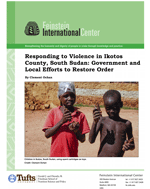This report from an understudied area details the effects of and responses to violence in Ikotos County in Eastern Equatoria in Southern Sudan. The author, from Southern Sudan himself, draws upon five years of experience, observation and interviews in Ikotos and supplements this information with data from interviews with local officials and community groups.
Ikotos was spared much of the fighting during Sudan’s protracted north-south war, but has been host to violence and insecurity caused by tensions between sub-tribes, displacement brought by the presence of soldiers of the Sudan People’s Liberation Army (SPLA) and of the Government of Sudan (GoS), and activity by the Ugandan rebels, the Lord’s Resistance Army (LRA). The supply of weapons increased with the presence of the various armed groups. Cattle raids and revenge attacks among sub-tribes became increasingly deadly. By the 1990s Ikotos was infamous for its high rate of gun violence. This report examines the effects of violence on communities and the efforts of local leaders and civil society organizations to address and eventually curb this violence.
Inhabited by a number of minority ethnic groups, this region of Southern Sudan has received relatively little attention over the years. This report provides valuable insights and analysis on the extent and repercussions of violence in the area, the gendered and generational effects of the insecurity, and the role of grassroots and official efforts to prevent the violence. This rich analysis allows for a better understand of both the prospects for stability and the implications for regional stability should peace not be realized.







